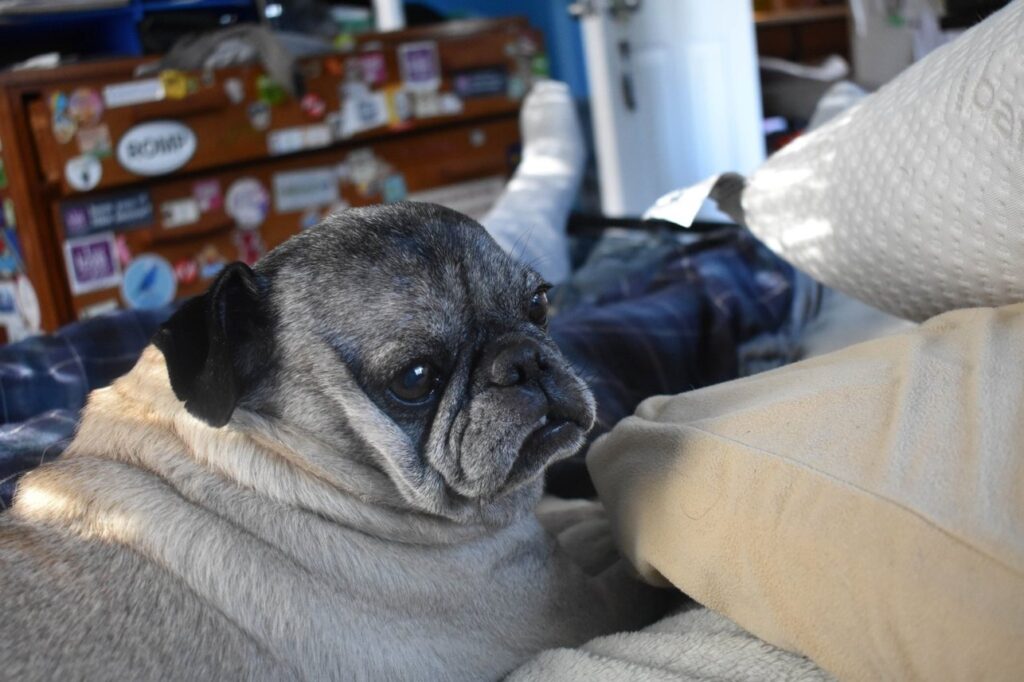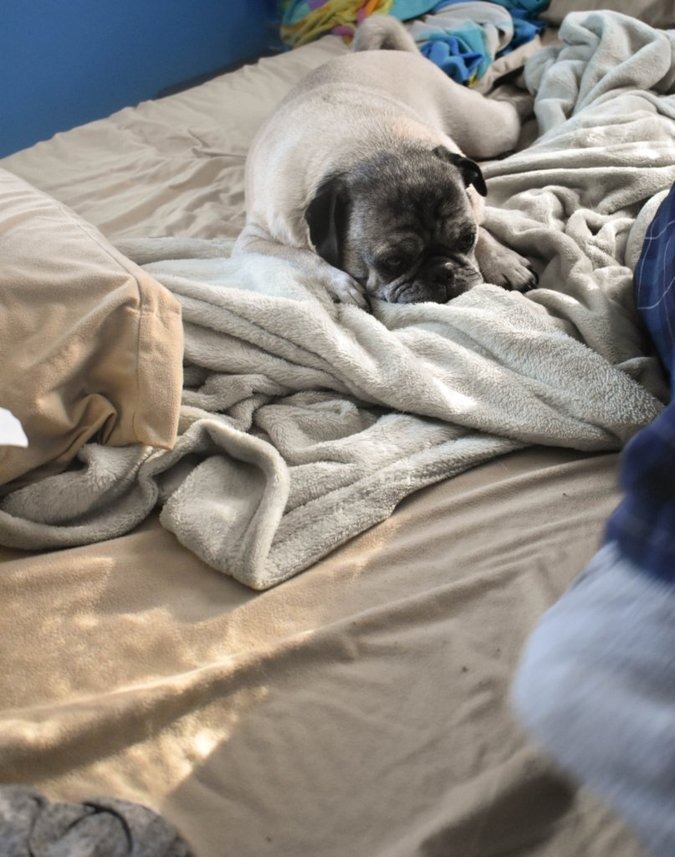
Pug Being Lethargic: Causes and Help for Low Energy
It can be worrying when your pug suddenly seems sluggish and low energy. While brief laziness is normal, ongoing lethargy often signals an underlying health issue. Read on to understand common causes of reduced activity levels in pugs and when to seek veterinary care. With attentive care and treatment of any medical conditions, you can get your pug back to their peppy, playful self.
Common Causes of Lethargy in Pugs
Pugs are prone to various conditions that sap their energy, including:
- Illness – Infections, pneumonia, kennel cough, flu, etc.
- Endocrine disorders – Hypothyroidism, diabetes, Cushing’s disease
- Obesity – Excess weight stresses joints and organs
- Dental disease – Infected or painful teeth and gums
- Allergies – Environmental or food allergies cause inflammation
- Pain – Arthritis, back issues, injuries, postoperative pain
- Medications – Sedating drugs or those with fatigue as a side effect
- Diet issues – Poor nutrition, food intolerance, dehydration
- Extreme weather – Heat stroke or chilling
- Boredom and depression – From isolation, lack of stimulation

When Lethargy Warrants a Vet Visit
Contact your vet promptly if lethargy is accompanied by:
- Fever
- Labored breathing
- Appetite loss
- Weight loss
- Vomiting/diarrhea
- Inability to stand or walk
- Bluish gums or tongue
- Collapse or loss of consciousness
Get emergency care immediately if your pug collapses, cannot be roused, has seizure-like activity, or shows signs of shock like pale gums. These require urgent veterinary assessment to determine if life-threatening issues like toxicity, organ failure, or trauma are responsible for the low energy levels.
Is My Lethargic Pug Just Sad?
While health concerns are the most common source of lethargy, situational factors can also sap a pug’s spirit temporarily. Changes in routine, isolation, boredom, stress, or depression due to loss of a companion can lead to lower activity levels. However, sustained lethargy or refusal to engage in enjoyable activities warrants medical evaluation. Your vet can determine if sadness is the sole cause or if illness is also at play.
How To Help a Lethargic Pug
Depending on the underlying cause, you may be able to perk up your sluggish pug at home by:
- Altering diet – Add wet food, try home cooking, ensure adequate hydration
- Encouraging gentle exercise – Short walks and play sessions
- Massage – Improve circulation and soreness
- Adjusting medication dose – Consult your vet
- Adding supplements – Omega fatty acids, glucosamine
- Addressing dental/joint pain – With veterinary treatment
- Providing stimulating toys – Food puzzles, snuffle mats
- Increasing companionship – More supervision, less alone time
When Lethargy Comes On Suddenly in Pugs
Sudden lethargy or collapse warrants same-day veterinary assessment to determine the cause. Some possibilities include:
- Toxin ingestion – Foods, chemicals, or medications
- Allergic reaction – Bee stings, vaccines, new food
- Low blood sugar – Diabetes or liver disease related
- Infection – Sepsis, parvo, leptospirosis
- Pain – Acute injury, bloat, anal gland impaction
- Cardiac issues – Fainting spells, arrhythmias, heart failure
How to Evaluate Appetite Changes in a Lethargic Pug
Appetite often diminishes when a pug feels unwell. Note if your lethargic pug:
- Skips meals altogether
- Takes much longer to eat
- Leaves food uneaten
- No longer is excited at meal times
- Is vomiting or having diarrhea
Check gum color for signs of dehydration. Offer bland foods like chicken and rice to entice eating. Assist weak pugs to eat. Seek prompt veterinary care if appetite does not improve in 12-24 hours.
Knowing When to Call the Emergency Vet
Head to emergency veterinary care if your lethargic pug displays:
- Pale or purple gums/tongue
- Difficulty breathing
- Multiple seizures
- Uncontrolled vomiting/diarrhea
- Sudden collapse or unconsciousness
- Signs of extreme pain like crying out
- Bleeding from nose/mouth/rectum
Caring for a Lethargic Senior Pug
Older pugs naturally slow down, but drastic drops in energy still warrant examination to rule out new illness. Manage senior lethargy by:
- Having arthritis treated
- Scheduling regular senior wellness exams
- Giving prescribed joint supplements
- Providing ramps, beds, and accessibility
- Monitoring for adequate hydration/appetite
- Adjusting length and frequency of walks
- Ensuring proper nutrient intake
- Ruling out dental pain, thyroid disorders, organ issues

How Long to Wait Before Contacting a Vet For A Lethargic Pug?
For mild lethargy with no other symptoms, monitor at home for 12-24 hours. Offer tempting foods and monitor gum color. If no improvement within a day or condition worsens, seek veterinary examination. Get emergency care immediately if gums turn pale/blue or collapse occurs.
OTC Supplements for Pug Energy
Discuss glucosamine, omega fatty acids, vitamin B, melatonin, SAMe, and milk thistle with your vet. Some may help moderately boost energy and reduce joint pain when used as prescribed. Avoid giving any new supplements without your vet’s approval.
Should I Change Diet for a Lethargic Pug?
Switch to a bland, easily digestible diet like boiled chicken and white rice to help rule out GI upset. Ensure adequate hydration with added broths. Discuss prescription food or novel protein trials with your vet to check for food intolerance. Gradual changes may help, but drastic switches can worsen gastric upset.
Can Dental Disease Cause Lethargy in Pugs?
Yes, severe dental disease is painful and can lead to tooth root abscesses, mouth inflammation, and systemic infection. Pugs refusing food or play may have painful mouth issues. Have your vet examine for dental problems and treat any found. Professional cleaning and extractions often renew energy.
Exercising a Lethargic Pug
Try short 5 minute walks or gentle play sessions to see if exercise increases alertness. Stop if your pug shows discomfort or labored breathing. Low-impact activity can boost endorphins but don’t over-exert an ill pug. Adjust intensity to your pug’s stamina.
Pug Allergies and Fatigue
Chronic allergic reactions can leave pugs feeling drained. Itchy skin, ear infections, and respiratory inflammation are taxing. Identify and limit allergen exposure. Discuss antihistamines or immunotherapy with your vet for relief of allergy-related exhaustion.
Car Sickness Causing Lethargy?
Motion sickness can dramatically reduce activity before and after car rides. Try home remedies like ginger, mint, or rescue remedies. Prescription anti-nausea medication from your vet can prevent nauseous fatigue. Short, positive car trips may help reduce anxiety contributing to carsickness.
With attentive care from pet parents and targeted treatment from vets, most pugs with lethargy due to health conditions can regain their enthusiasm. But chronically lazy pugs do require ongoing management to maintain the best quality of life possible. Stay observant of your pug’s activity levels and appetite so prompt veterinary care can be delivered when needed

Leave a Comment